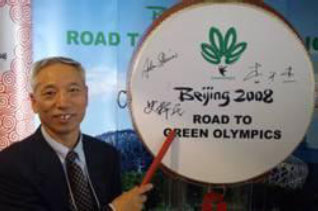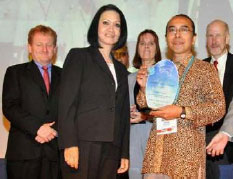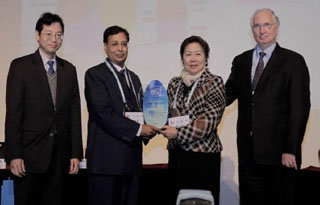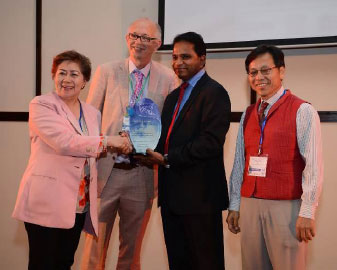
Kong Ha Award (BAQ)
Kong Ha Award for Excellence in Air Quality Management 2016
In 2008, the Clean Air Asia Partnership established the Kong Ha Award for Excellence in Air Quality Management to honor the memory of the late Kong Ha, who served as the chairperson of the Clean Air Initiative for Asian Cities (Clean Air Asia) from December 2004 to April 2007.
The award serves as a tribute to persons who have a responsibility for the formulation of air quality management related policies and their day-to-day implementation in Asia. This, in the view of the Clean Air Asia Partnership, is the best way to honor Kong Ha, who through his deep commitment and knowledge, relentless enthusiasm, and strong sense of partnership was a key person in shaping and overseeing the implementation of mobile source emission reduction policies in Hong Kong.
The Kong Ha award for Excellence in Air Quality Management in Asia is handed out by the Clean Air Asia Partnership in conjunction with the Better Air Quality (BAQ) conferences of which Kong Ha, together with Wing-tat Hung (Hong Kong Polytechnic University) and W.C. Mok of Hong Kong EPD were the founding fathers.
Eligible for the Kong Ha Award are persons who are working and excel on day-to-day basis in respect to the formulation and implementation of air quality management policies. All fields of air quality management qualify: mobile, stationary and area sources of pollution. Potential candidates can come from local or national government, civil society or academic or research institutions in developing Asia. Candidates can be nominated by organizations or individuals. Self-nominations will not be accepted. The Kong Ha Award Committee, through its secretariat will also solicit the submissions of applications from worthy candidates.
The winner of the Kong Ha award will be awarded at the conference following the recommendation of the Kong Ha Award Committee which oversees the selection of the winner of the Kong Ha award.

Shi Han Min joined the Beijing Environmental Protection Bureau (EPB) in 1978 and became Director in 2002. Much of his efforts have been directed to improving air quality management in Beijing. Under his guidance, the EPB built, in the past 7 years, a team of young and committed staff to work on the formulation and implementation of the extraordinary plan for cleaner air during the Olympics and Paralympics. For this, they had to shrink 20 years of international air quality management know‐ how into 7 years.
The implementation of regional and urban air quality management policies in Beijing required an effective coordination of several bureaus inside the Municipal Government. This is one of the most remarkable achievements of Director Shi Han Min, who managed to forge cooperation among several Municipal and other stakeholders in the fight for better air quality.
From the optimization of the energy structure and the control of coal burning pollution to the enhancement of vehicle emission control and vehicle emission standards, the rate of improvement of air quality in the past 7 years has almost equaled that of the economic growth of Beijing. Measures taken to ensure clean air during the Olympics have been an effective combination of long and short term measures. It is hopeful that some of the actions taken by the Beijing EPB, such as the monitoring of PM2.5 and O3 have stimulated national policies and regulations to be issued by the China Ministry for the Environment. Also, the Kong Ha award committee has taken note of the broad based public discussion in Beijing and China on the need to make permanent some of the short term measures taken during the Olympics.
Within the commitment to cleaner air in Beijing, an important milestone has been the acknowledgement of the need for a regional approach to tackle the air pollution problem in the Chinese capital. Since 2004, the Beijing Bureau has been working with 5 neighboring provinces to understand their contribution to the air pollution in the urban areas of Beijing and to draw up feasible, politically acceptable, concerted measures to minimize it. This has made Beijing a pioneer in the adoption of a regional approach to air quality management in Asia.
A charismatic leader, a generous and warm‐hearted man in private life, Shi Han Min has been able to inspire confidence in his team and affiliated academies and scientific bodies, domestically and internationally. The work of Shi Han Min is a milestone for air pollution control since he demonstrated how this important problem can be tackled and solved. Thus, the achievements of his work goes well beyond the Olympic Games and the city of Beijing, being a clear model for all Chinese cities and for other countries in Asia where air pollution is still an important problem.

Pupt is best known for spearheading the phase out of lead from gasoline in Indonesia which was successfully achieved in 2006. He continued to monitor the implementation of these policies, exposed several cases of anomalies, and played a key role in court cases that challenged the more stringent fuel quality standards.
One of the main reasons why the Kong Ha Award Committee decided to honor Puput is that civil society is often a critical player in advancements of air quality, but least recognized for its efforts. Puput was not a government official or in a similar decision‐making role when he started his campaign for the lead phase out.
He started by establishing the Komite Penghapusan Bensin Bertimbel (KPBB, www.kpbb.org) in 1996 as an advocacy group for the phase‐ out of leaded gasoline supported by three other NGOs: The Indonesia Forum for Environment – Jakarta Region, the Indonesian Center for Environmental Law (ICEL), and Lemkohi, a program of Segar Jakartaku.
To achieve its objective, broad public support with active media involvement was essential, and thus a public awareness and media campaign was initiated that included mass communication and training on sources of lead and air pollution and its impacts on environment and health, especially that of children. Puput mobilized the public to take part in a long march demonstration against the use of lead in gasoline.

He also had to bring many stakeholders on board and work closely with the Indonesian government and the private sector to obtain the support needed to make the phase out of lead in gasoline a reality. Dialogues were held with government officials, parliament members, private sector executives and others in decision‐making roles, and support was given to government in formulating draft policies with the inputs of academics and other experts on fuel and air quality.
Like Kong Ha, Puput is collaborative and creative rather than aggressive and dogmatic in his approach. At the same time, he had to be persistent in fighting an uphill battle against many vested interests and to overturn the frequent delays in the introduction of unleaded gasoline. This combination enabled him to establish partnerships and gain the public support needed, and as head of KPBB he continues to advocate for better air quality and improved public health in Indonesia through policy reforms.
Opening Plenary BAQ 2010 ‐ Presentation of Kong Ha Award : http://www.youtube.com/watch?v=wUSsBCelpE8 Acceptance Speech of Kong Ha Award : http://www.youtube.com/watch?v=eMIpxq0a5CY&feature=relmfu

Dr. Sharma stands out in air quality management arena as he highlights the issues through scientific analyses and then argues for changes in policies which easily find favour with the stakeholders. One of his greatest achievements is the inclusion of new parameters (ozone, arsenic, nickel, benzene and benzo(a)pyrene) to the Revised National Ambient Air Quality Standards in 2009. Based on the premise of the constitutional “right to better air quality”, Dr. Sharma spearheaded the consultation with various stakeholders before the revised air quality standards were notified by the Union Government for the nationwide implementation of these standards.
For ten years, he worked at the Central Pollution Control Board in New Delhi and has participated in shaping the policies on emissions reduction from both mobile and stationary sources in India. Since December 1997, he has worked at the Indian Institute of Technology (IIT) Kanpur as a Professor of Civil Engineering. His research on the formation of fine secondary aerosols through atmospheric chemistry has transformed the thinking on how air quality must be improved in India. He engaged in studies on emissions inventory and source apportionment for Indian cities, most notably in Kanpur, and has determined an optimum mix of management options to control emissions from motor vehicles and industries. These studies were peer-reviewed and published in scientific journal papers. Moreover, the Government of India accepted Dr. Sharma’s studies in considering policy changes.
Dr. Mukesh Sharma was the first head of the Centre for Environmental Science and Engineering, engaged in environmental technology development, at the IIT Kanpur. He has worked extensively in the areas of air quality monitoring and management and exposure assessment.
His innovative research on the sequestration of carbon dioxide through algal mass holds considerable promise in mitigating climate change. He also identified the merits of titanium dioxide and nanoparticles in influencing air quality. His research on attaching mobile units to vehicles to collect not just point-specific data, but also regional data, broke new ground. He has published over 100 papers in national and international journals and conferences. He has also been the principal investigator of many research projects, which have been funded by France, Norway, Sweden, the World Bank, and various agencies in India.
In summary, Dr. Sharma is a diligent scientist who has melded rigorous research with policy engagement. He has played a pivotal role in setting air quality standards in India and in enabling policy makers to make science-based decisions.
Acceptance Speech of Kong Ha Award : http://www.youtube.com/watch?v=tb4AIzhYcUQ

Pioneer. Leader. Commitment. These are the words that best describe Dr. B.M.S. Batagoda, currently the Deputy Secretary to the Treasury in the Ministry of Finance and Planning in Sri Lanka—and winner of the Clean Air Asia’s Kong Ha Award 2014.
Dr. Batagoda’s work in air quality management helped Sri Lanka to achieve tremendous results in improving air quality through wider and effective stakeholder participation. Back in 1998 when he was appointed as Director for air quality management in Sri Lanka’s Ministry of Environment, air quality was not a priority in the government’s action plans. One of his most significant contributions was the development of the Air Resource Management Center (“AIRMAC”), an organization in the Ministry of Environment which is comprised of key stakeholders from the public and private sector related to air quality management. Dr. Batagoda was appointed as the first Director of the AIRMAC. Under his leadership, the AIRMAC became an effective platform for multiple stakeholders to develop policies, strategies and action plans. As these plans and concepts were implemented and achieved results, his work and his team garnered commendations from higher authorities, international policy experts and organizations.
Milestones achieved under Dr. Batagoda’s public service include policies for cleaner fuels, vehicles and transport such as standards for vehicular emission, fuel quality and vehicle importation, the elimination of lead gasoline in fuels in the country, the banning of 2-stroke wheelers and spare parts, the reduction of sulphur content in diesel fuel from 8000ppm to 3000 ppm and the introduction of 500 ppm and 10 ppm super diesel in 2004 and 2014, respectively. He established concessions for private bus operators to import buses to substitute the existing fleets and had a tax reduction established hybrid and electric vehicles scheme as well as implemented the Vehicular Emission Testing (VET) program.
Dr. Batagoda was also key in establishing “Clean Air Sri Lanka” which now facilitates and coordinates air quality management programs and activities. He led the development of strategies, policy and activities to curb indoor air pollution and ambient air pollution, leading to the mainstreaming of air quality management and environmentally sustainable transport in national development planning. The most significant of such developments includes: the National Air Quality Management Strategy for Sri Lanka, Clean Air 2007 & 2015 Action Plans, and the introduction of the air quality research and symposium series Air that We Breathe, among other activities. Dr. Batagoda also established the Climate Change Secretariat, the Sri Lanka Carbon Fund and Sri Lanka Vehicle Emission Test Trust Fund, and was instrumental in setting up the Environmental Convention Reference Centre, and other centers of learning in the field. He is also a consistent supporter of the Better Air Quality Conference.
Such is the dedication of Dr. Batagoda in his field that even after he was promoted to the post of Deputy Secretary to the Treasury, Ministry of Finance and Planning, he voluntarily involved himself in most of the air quality management activities implemented in Sri Lanka, regionally and internationally.






